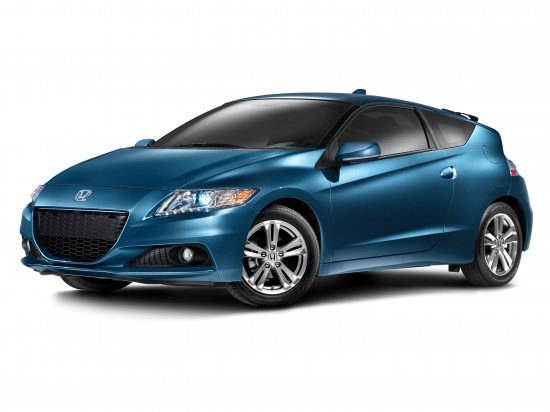September 2014 Sales: Honda CR-Z Takes Another Dive
September 2014 was American Honda’s lowest-volume CR-Z sales month since December 2012.
248 CR-Zs were sold last month even as Honda dealers sat on sufficient inventory, at least by the standard of the CR-Z’s low desirability quotient, to sell more. According to Automotive News, Honda had a 79-day supply of CR-Zs at the beginning of the month, and of the 963 new CR-Zs Cars.com is currently showing in its database, the vast majority were in stock during the month of September.
Through the first eight months of 2014, Honda was selling 337 CR-Zs per month. Honda sold 4550 CR-Zs in 2013, equal to 379 per month. Monthly volume peaked at 1819 units in April 2011. After 5249 CR-Zs were sold in the final five months of 2010, annual sales reached 11,330 units in 2011 and then plunged to 63% to 4192 units in 2012. 2013’s recovery, at less than 9%, was moderate.
We’ve known for years that the CR-Z was not a CRX successor, but success could theoretically still have been located in some dark corner of the American car market if consumers had been convinced that the CR-Z represented something no other automaker offers. It’s an efficient two-seater with oddball styling, a desirable Honda badge, and some joy in its chassis.
Unfortunately, the CR-Z isn’t really all that efficient, with EPA numbers of less than 40 mpg on the highway. Manual-transmission CR-Zs are rated at just 31 mpg in the city.
In its record-setting month of April 2011, the CR-Z accounted for 2.6% of Honda passenger car sales, a figure which fell to 0.4% in September 2014, when sales were 86% down from that peak performance. Year-over-year, September sales were down 6%, a decline of 16 units as the overall auto industry grew 9%, as Honda brand passenger car sales jumped 17%, as Honda sold 1095 Accord Hybrids.
As for CR-Z alternatives, it’s difficult to know where to start, as there are no absolutely direct rivals. Fiat 500 sales jumped 29% to 2737 units in September. The Hyundai Veloster was up 22% to 2777 sales. Mini’s five-pronged Cooper range was down 42% to 2116 units. Scion tC sales fell 15% to 1404. Total Volkswagen Beetle volume was down 49% to 1821 units.
As for cars which sold in CR-Z-like numbers last month, that list includes the Porsche Boxster (275), Hyundai Equus (261), Jaguar XF (258), Porsche Cayman (245), the Nissan Cube (238), and Honda’s own Insight (240).
Ah yes, the Insight. We’ve already discussed its demise. As much as the CR-Z wasn’t as well executed as enthusiasts would have wanted, we can hope that Honda won’t force us to write a CR-Z eulogy any time soon. We can hope Honda will give it another shot, not with a supercharger, but with a completely new approach. There’s no need for Honda to give up. We’ve had about enough of the giving up with the dead and gone CRX, Integra, RSX, and Prelude.
Timothy Cain is the founder of GoodCarBadCar.net, which obsesses over the free and frequent publication of U.S. and Canadian auto sales figures.
More by Timothy Cain
Latest Car Reviews
Read moreLatest Product Reviews
Read moreRecent Comments
- Fred I would get the Acura RDX, to replace my Honda HR-V. Both it and the CRV seats are uncomfortable on longer trips.
- RHD Now that the negative Nellies have chimed in...A reasonably priced electric car would be a huge hit. There has to be an easy way to plug it in at home, in addition to the obvious relatively trickle charge via an extension cord. Price it under 30K, preferably under 25K, with a 200 mile range and you have a hit on your hands. This would be perfect for a teenager going to high school or a medium-range commuter. Imagine something like a Kia Soul, Ford Ranger, Honda CR-V, Chevy Malibu or even a Civic that costs a small fraction to fuel up compared to gasoline. Imagine not having to pay your wife's Chevron card bill every month (then try to get her off of Starbuck's and mani-pedi habits). One car is not the solution to every case imaginable. But would it be a market success? Abso-friggin-lutely. And TTAC missed today's announcement of the new Mini Aceman, which, unfortunately, will be sold only in China. It's an EV, so it's relevant to this particular article/question.
- Ajla It would. Although if future EVs prove relatively indifferent to prior owner habits that makes me more likely to go used.
- 28-Cars-Later One of the biggest reasons not to purchase an EV that I hear is...that they just all around suck for almost every use case imaginable.
- Theflyersfan A cheaper EV is likely to have a smaller battery (think Mazda MX-30 and Mitsubishi iMEV), so that makes it less useful for some buyers. Personally, my charging can only take place at work or at a four-charger station at the end of my street in a public lot, so that's a crapshoot. If a cheaper EV was able to capture what it seems like a lot of buyers want - sub-40K, 300+ mile range, up to 80% charging in 20-30 minutes (tops) - then they can possibly be added to some lists. But then the issues of depreciation and resale value come into play if someone wants to keep the car for a while. But since this question is asking person by person, if I had room for a second car to be garaged (off of the street), I would consider an EV for a second car and keep my current one as a weekend toy. But I can't do a 50K+ EV as a primary car with my uncertain charging infrastructure by me, road trips, and as a second car, the higher insurance rates and county taxes. Not yet at least. A plug in hybrid however is perfect.


































Comments
Join the conversation
I didn't even know Honda still made these. I see more Rolls Royces than I do this waste of metal. How sad for Honda, took some great lineage and screwed this car up. Honda just needs to scrap the whole thing and start over. The thing is, this was a couple engineering choices from being a great car.
FYI on the 2015 Honda Fit. Off to an awful start. This is what screwing up a car is all about. They released it late due to problems, then they released it ... with problems. honda-recalls-2015-fit-because-failing-crash-tests-isnt-exactly-a-selling-point http://www.carcomplaints.com/Honda/Fit/2015/ http://www.techtimes.com/articles/13706/20140821/honda-recalling-fit-bump-up-safety.htm